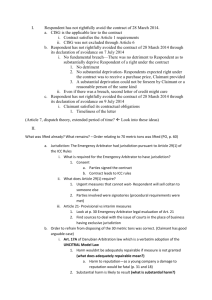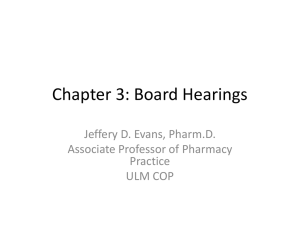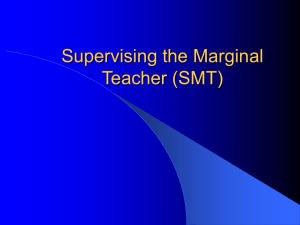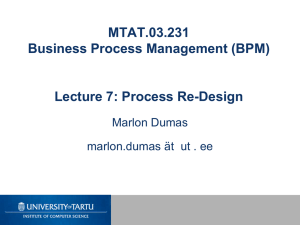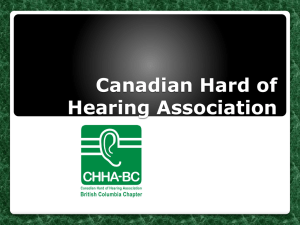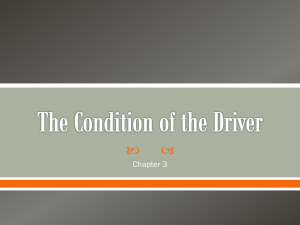Unless - Equality and Human Rights Commission
advertisement
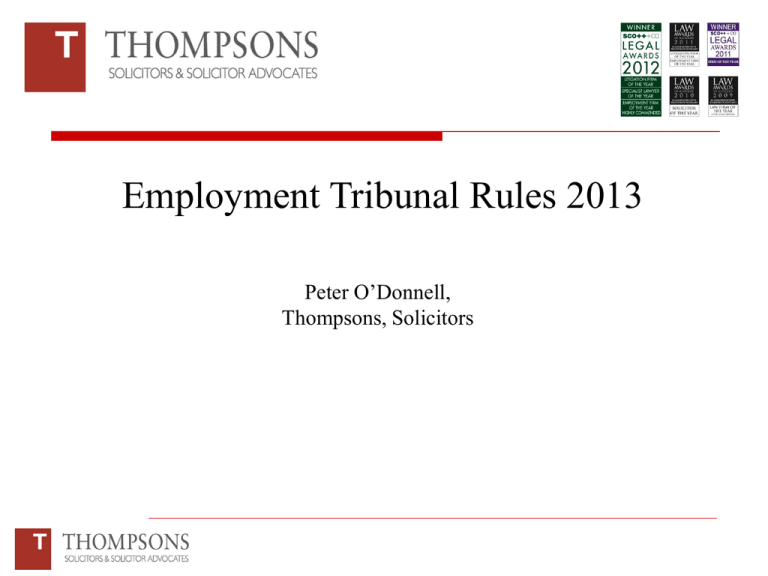
Employment Tribunal Rules 2013 Peter O’Donnell, Thompsons, Solicitors Relevant Legislation Employment Tribunals (Constitution & Rules of Procedure) Regulations 2013 Rules in Schedule 1 Intended to be simpler – 2004 Rules had 61 Rules and 2013 has 106 Rules Came into effect on 29 July 2013 Except new power to make practice directions under Reg 11 In effect 1 July 2013 If respondent receives ET1 before 29 July then 2004 Rules apply to any counter-claim Practice Directions Renews power of the President to make practice directions Including in relation to judicial mediation Can include different provisions for different cases, different areas or different types of proceedings Prescribed Forms Secretary of State has power to prescribe forms – Regulation 12 Reg 12(2) - Prescribed forms do not need to be used where: Case referred by a court Where ET is acting as appellate court Claims under s11 ERA (statement of particulars) Overriding objective Rule 2 – same formulation as before Ensure parties on equal footing Deal with case proportionately Avoid unnecessary formality and seek flexibility Avoid delay Save expense ET must give effect to objective and parties must assist in that Rule 3 – ET to encourage use of ADR At odds with decision to charge fee for judicial mediation Time – Rule 4 A requirement for an act to be done by a particular day may be done at any time before midnight Unless otherwise specified If act requires to be done on a day other than a working day then it is done in time if done on the next working day ie weekend, Xmas day, Good Friday etc Day of event is not included in calculation of time Within certain number of days of event or not less than certain number of days before/after Rule 5 – power to extend or shorten time Non-compliance/Irregularities – Rule 6 Failure to comply with Rules or order of ET will not of itself render proceedings void Except order under Rule 38 or 39 – unless or deposit orders ET can take action about non-compliance Eg strike out, expenses etc Presenting the claim(1) Rule 8 – Must use prescribed form and include minimum info Claimant and respondent name & address Online application currently has restricted format for address Will be rejected under Rule 10 If substantive pleading is longer than one page allowed for online application then can attach a paper apart Presidential Direction Claim to be presented by post, by hand or online Rule 9 – 2 or more claimants can use same form if claims based on same set of facts If wrong then treated as irregularity under Rule 6 Presenting the claim(2) Must include fee or remission application Or will be rejected under Rule 11 If fee paid is less than fee payable then claimant will be given time to pay balance before claim rejected If remission rejected then claimant will be given time to pay If using online application then can tick box stating making remission application Will be taken to online remission form Given 7 days to lodge hard copy evidence to support application Substantive Defects Claim can be rejected under Rule 12 if It is one that the Tribunal has no jurisdiction to hear It is in a form that cannot sensibly be responded to or an abuse of process Rule 13 allows for reconsideration Grounds Decision was wrong Defect can be rectified Must be made within 14 days Include request for hearing in application Response – Rule 16 Must be on prescribed form and include minimum information (eg name and address, whether resisting claim) Failure to use form or provide minimum info will mean response is rejected – Rule 17 Can include response to more than 1 claim or response from more than 1 respondent on same ET3 – Rule 16(2) & (3) Response will be rejected if presented late – Rule 18 28 days Similar provisions for reconsideration of rejection – Rule 19 Response - Extension of time Rule 20 allows for application to extend time to lodge response Can be made before or after time limit expires If time limit expired a copy of the response must be provided (or explanation why it cannot) Must be copied to claimant 7 days to object Rule 21 – No response If no response, response rejected or employer does not contest claim EJ can decide whether they can make determination on info available and if so make a judgment Otherwise a hearing shall be fixed Respondent entitled to Notice of any hearing but not to participate Except to extent allowed by Judge Counter-Claim Rule 23 – must be made as part of response Can be rejected on same basis as claim Claimant must respond within 28 days of the date ET3 sent to them Initial Consideration – Rule 26 EJ will consider all documents to confirm that there are arguable claims and defence Can make order for further information to be provided Can dismiss claim/response or part of claim/response – Rule 27/28 Must give reasons Must give notice that dismissal will take place on certain date unless written representations made why should not be dismissed If response being dismissed make Order as to effect If no dismissal then can make case management orders including listing of preliminary or full hearing etc Case Management Order Broad power in Rule 29 Rule 30 deals with how parties make an application Similar to current provisions Still requirement to copy to other side – Rule 92 Rule 31 – disclosure of document Rule 32 – attendance to give evidence, produce documents or provide further info Rule 34 – add, remove or substitute parties Rule 35 – permit other persons to participate where they have legitimate interest Lead Cases – Rule 36 New (express) power to specify one claim as a lead claim and sist others Common or related issues of fact or law Decision on issues on lead case is binding on other parties Non-lead party can apply for order that decision does not bind them 28 days Other Case Management Powers Rule 37 – Power to strike out Similar to power under 2004 rules Rule 38 – Unless Orders Rule 39 – Deposit Orders Increase to max of £1000 Rule 40 – non-payment of fees If fee not paid or remission application not made then ET will send notice of date to comply If not complied with by date then automatic dismissal of claim, counter-claim, application or judicial mediation But not response Rules Common to All Hearings(1) Rule 41 sets out, general, broad power for ET to regulate own procedure Rule 42 requires any party not attending and relying on written representations to lodge those not less than 7 days before hearing Rule 43 – any witness statement is taken as evidence in chief Unless ET orders otherwise Rule 45 – power for ET to impose time limits on parties in leading evidence, cross and making submissions Common Rules (2) Rule 46 – power to conduct hearings by electronic communications Just & equitable to do so Rule 48 – can convert preliminary hearing to full hearing and vice versa No material prejudice to parties Rule 50 – privacy & restrictions on disclosure Broader power than before Interests of justice or the protect Convention rights Must give full weight to principle of open justice and freedom of expression Party or person with legitimate interest can made representations for order to be revoked or discharged Withdrawal & Dismissal Automatic dismissal of withdrawn claims under Rule 52 unless: Claimant must express wish to reserve right at time of withdrawal and ET consider it is legitimate to do so Not in interests of justice Preliminary hearings Replace CMDs and PHRs Rules 53-56 ET has same powers as had at PHR Case management Deposit, striking out etc Preliminary issue Judge alone Unless considering preliminary issue and party makes written request – Judge considers it desirable Judgements Rule 62 – ET must give reasons on any disputed issue Rule 64 – provision for consent order/judgments Rule 65 – Judgment takes effect on day given Rule 66 – 14 days to comply with judgment or order for payment of money Unless different date specified Rule 69 – correction of clerical errors or slips Reconsideration Replaces Reviews Rules 70-73 Only single ground for application Interests of justice 14 days to apply from date written decision sent to parties Procedure set out in Rule 72 Costs & Preparation Time Orders Rules 74-84 Very similar to 2004 rules Increase of sum that can be ordered without assessment to £20,000 Power to order reimbursement of fees Rule 75(1)(b) – test in Rule 76(4) Miscellaneous Rules 85 -91 – Delivery of Documents Expressly allows for delivery by electronic means Rule 99 – transfer of proceedings between Scotland and England

